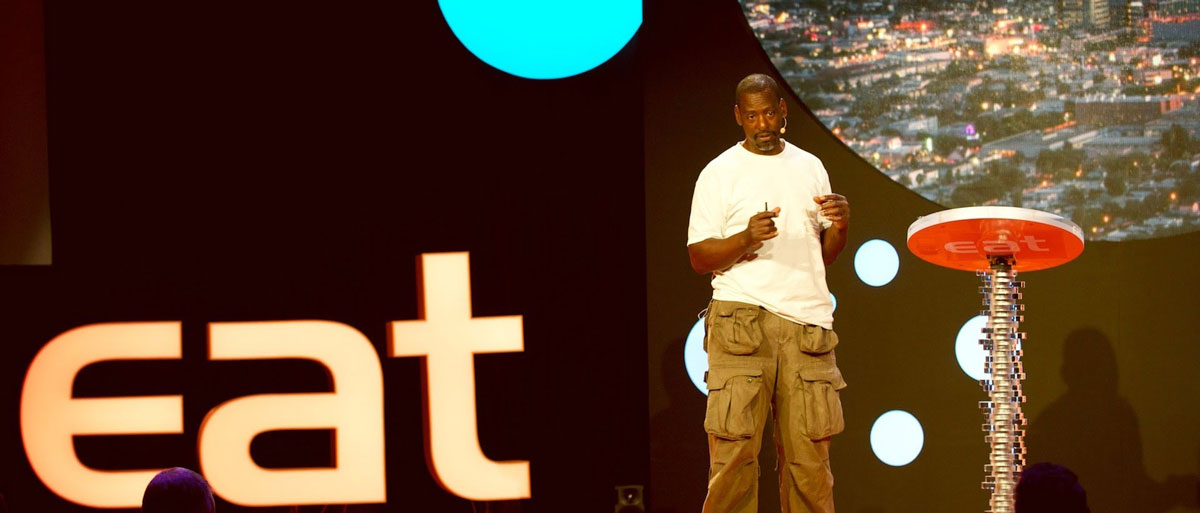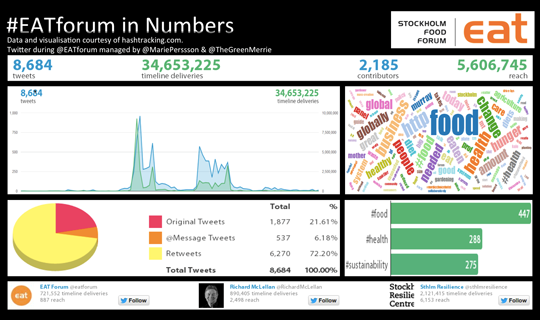
Artist and designer Ron Finley, a self-proclaimed guerrilla gardener from Los Angeles, urged the participants at the EAT Food Forum to go out and "Do epic shit", a message that hit home among the audience. Photo: YouTube
Food, health and sustainability
What next for EAT Stockholm Food Forum?
A successful first forum raises expectations for the second
- EAT is the first global forum to integrate knowledge on the food system, health and sustainability as one interlinked challenge
- The forum was also about creating a double triple helix which merged science, business and policy
- A wide array of experts delivered a clear message: what we eat not only determines our health but also the health of the planet
When Ron Finley, a self-proclaimed, no-nonsense "guerrilla gardener" from Los Angeles ended the 2014 EAT Stockholm Food Forum with the message "Do epic shit", it was not only a challenge for everyone to push for change and stretch one’s own limits, it was also a fitting call for the organisers of EAT to strengthen the expertise and the sharing of knowledge on food, health and sustainability.
The forum, which was co-organised by the Stordalen Foundation and the Stockholm Resilience Centre, was a first global initiative to integrate knowledge on the food system, health and sustainability thus considering these three spheres as one interlinked challenge.
From H.R.H. Prince of Wales to President Bill Clinton via a wide array of experts on nutrition, non-communicable diseases and sustainable business strategies, the message was clear: what you eat not only determines your health but also the health of our planet.
But the forum was not just about addressing the nexus of food, health and sustainability, it was just as much about creating a double triple helix which merged science, business and policy with the aforementioned issues. A general consensus was that we have the knowledge, now is the time to act. Furthermore, given the powerful role of business it should also show more responsibility.
Strong recommendations
So what now for EAT Stockholm Food Forum?
In his closing remarks, centre director Johan Rockström drew upon reflections from the many parallel competence forums on how the forum could develop further. In areas such as economics, governance, business and science, there were several strong recommendations:
- Create a new model for full-cost internalisation
- Identify areas of large untapped potential for major positive change
- Introduce EAT in schools, and nutrition and sustainability guidelines for procurement
- Develop a new narrative of successful business and let EAT be a credible and neutral ground for dialogue on complex and contentious issue
- Develop studies on peoples’ behaviour and dietary choices
- Explore agricultural transformations and requirements to meet healthy diets
- Translate metrics into action and advance integrated indices for sustainable and healthy food system
- Develop bottom-up approaches that engage farmers and stakeholders
- EAT to contribute breaking inertia and "privileged positions" and amplify neglected voices in the policy arena
- Engage actors along the entire value chain
For videos, news updates and picture gallery, go to the EAT Forum website.
Twitter at #EATforum

Over the course of two days more than 2100 people contributed, sending nearly 9000 tweets for a combined reach of nearly six million. In addition, the digital echo of the conference, represented by the total number of timelines that were delivered Tweets about EAT forum, was nearly 35 million. The issues raised in the tweets reflected the interdisciplinary nature of those in the room and those following the forum online. The most popular hashtags after #EATforum itself was #food, #health and #sustainability.






